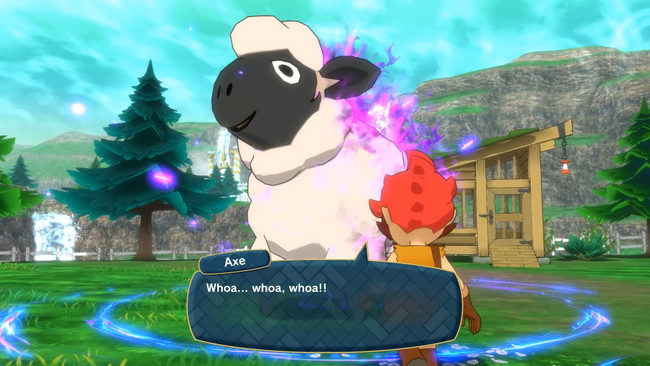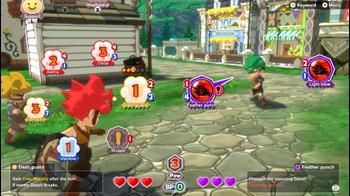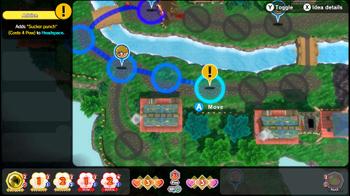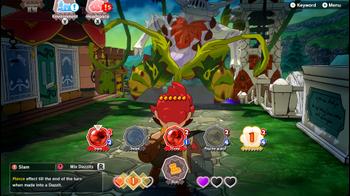Little Town Hero Review
Slipping in right on the cusp of a brand-new Pokémon generation, Game Freak’s Little Town Hero is an intriguing side project that caught my eye when it was announced last year. It comes from the mind of Masao Taya, a veteran Pokémon series programmer that also directed 2016’s most overlooked 3DS game, Pocket Card Jockey. Experimental gameplay mechanics, especially in RPGs, always perk my ears up and Little Town Hero is chock-full of them; they don’t all necessarily hit the mark, though the creative ways it executes upon them is noteworthy nonetheless.

The set-up is simple enough. Monsters mysteriously begin showing up one day in a small, quaint village and as its name implies, a young miner named Axe takes it upon himself to protect the town from them after accidentally hurting the old knight tasked with it. Sure it doesn’t sound all that special, but I was a bit surprised at how much Little Town Hero exudes an Animal Crossing-esque atmosphere. The game carries a certain somewhat similar charm to it that becomes readily apparent through Little Town Hero’s colorful side cast. It does a remarkable job making every character feel like they matter because of the nature of the game’s oddly nuanced combat system.

Little Town Hero’s battles are a strange mix of a traditional turn-based JRPG blended with a board game. Encounters revolve around Axe’s potential moves (his ideas) clashing with a single opponent until all three of their hearts deplete. Of course, this is easier said than done.
All of Axe’s ideas, Izzits, take a certain amount of AP before they can be primed for use - in which they become Dazzits. Most battles start him off with 3 AP and he’ll gradually accrue AP as turns pass by. His ideas come in three color-coded variants: red offense moves can only be executed once per turn, yellow defense moves are reusable in order to fend off incoming attacks, and blue moves are like items that usually provide a buff or debuff.
Let me take a moment to explain. Every red and yellow idea comes with a set value for attack and defense. When they’re put up against an enemy’s Dazzit, both Dazzits’ attack values subtract from the opposing move’s defense value and if a move’s defense goes to 0, it breaks. In order to start attacking an opponent’s health directly, Axe has to break all of their Dazzits in a single turn and have an unused red Dazzit on hand to deal the blow. Several major battles don’t make it this straightforward though, with shields that have to be taken down first and other nasty gimmicks hindering Axe even further. To make matters more harrowing, Axe only has a limited number of moves in his “deck” so-to-speak and if they all break, he either has to accept getting damaged, expend BP acquired from breaking all of an enemy’s Dazzits repeatedly, or rely on his childhood friend, Pasmina, to refill it.

The board game counterpart surfaces after every turn. The camera zooms out into an overhead view of the map and the next battlefield is determined through a roll up to four spaces. This becomes a core part of dealing with monsters because several spots may have helpful allies to aid Axe, like his mom or a chicken. Although Little Town Hero doesn’t have any traditional party members to fight alongside him, support characters or items in these spaces spice up battles and help tip the often overwhelming odds in his favor. A certain town chef may give Axe the ability to fuse two moves together or a random NPC might give him a new idea specifically conjured to counter a monster’s ability.
Though the game has no traditional leveling system or weapons and armor to equip, character progression comes in the form of Eureka points. They’re gained by winning battles and are spent in Axe’s skill tree to pump up the stats and capabilities of his ideas. Completing sidequests may also yield Eureka points and new allies may start showing up as a result too.
There are a lot of riveting mechanics in play throughout Little Town Hero’s battles and it even mixes up parts of it with more puzzle-like approaches, but I ultimately felt frustrated with it as I finished. The game desperately needs some sort of fast-forward option to speed up the slow, reused animations and turn transitions; later battles start eating up 45 minutes or more because Axe is pretty much forced to play defensively from the get-go to build up AP without taking too many hits. Running around the town could also use some sort of fast-forward, too, because Axe’s max run speed is sluggish, despite having a robust fast-travel system to every part of the village.

Enemy balance eventually becomes a nightmare too. I very much appreciate it when games manage to strike a balance in difficulty scaling to keep things challenging for me while playing fair, but Little Town Hero really dug its heels in preemptively sabotaging my options. Foes begin to start stacking the odds against Axe by getting free moves against him before he gets the chance to act; it’s difficult to strategically plan ahead when monsters can break prepared Dazzits beforehand or transform them into useless ones on a whim that’ll damage Axe when they’re easily broken. These all factor into my aforementioned qualm with the lengthy runtime of battles, but the real test of my patience was the final boss’s awfully designed gimmick. Let’s just say that I was left praying for good rolls when I ran out of ways to manipulate my movement after each turn.
Another tremendous issue I have with Little Town Hero is how poorly optimized it runs. Its constant jitteriness is a mess; panning the camera around on my TV often made me a tad nauseous, though it was slightly less irritating on handheld mode. Turning off camera follow eased it up for me until I had to constantly move it to see where I was going. Moving around menus, especially Axe’s skill tree, was weirdly laggy too for some reason. There are frequent freezing issues when talking to NPCs that have a scene associated with them; I’ll walk up to someone to advance the story and the game will just freeze up for a good three seconds as if it were struggling to load in the next part. Loading screens would often have the sound cut out as well. Little Town Hero is also filled with other fun technical hiccups like noticeable pop-in, severe framerate drops in combat (especially when Axe does his finisher), and delayed controller inputs after a scene in which Axe will awkwardly stand still until he can detect the controller again. Game Freak has built up a reputation of optimization woes in its lifetime and it is prevalent in Little Town Hero more than ever.
Even though its severe issues with optimization and gameplay balance have soured me on it, Little Town Hero is a neat game that I don’t regret checking out. Listening to the amazing tunes of Hitomi Sato and guest composer Toby Fox of Undertale fame throughout my 15-hour playthrough made for an enjoyable experience after all is said and done. There are a plethora of creative ideas inside Little Town Hero and I wish it came together more cohesively. Several performance and quality-of-life enhancements will go a long way for this game if it ever receives those patches.